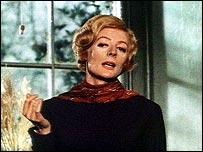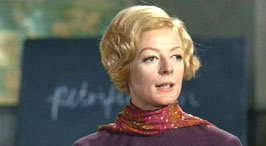Thursday, January 26, 2006
Thursday, October 13, 2005
Stephen Farber
".... We've seen a lot of movies about saintly schoolteachers..., but Jean Brodie is not the noble, self-sacrificing heroine we expect; there's something frightening about the influence she wants--and gets--over her girls' lives. She goes so far as to scheme to involve one of her girls with her own former lover (a sort of intercourse by proxy), and sends another girl off to fight for Franco in Spain, where she is killed. A Svengali of the boarding-school, Miss Brodie is a strange mixture of idealistic aesthete and fascist, sexual libertarian and fierce authoritarian--a character we may know from life, but whose intriguing paradoxes have rarely before been dramatized in films. Though Miss Brodie is a monster, she is appealing too, for her desires are only more extreme forms of desires we all have. She refuses marriage because she will not accept a subservient role in her society; she insists on creating a meaningful life that is hers alone. Her dedication to teaching is ultimately selfish--she wants dominion, power to control other destinies, the satisfaction of molding human lives in her own image. A classic kind of pride, of course, and unfortunately the film sees fit to punish Miss Brodie for her sin. The conclusion, in which her whole world collapses around her, seems overly moralistic; but more damagingly, it seems false to the characterization--no one as astute and calculating as Miss Brodie has appeared through most of the film could be so completely blind to the betrayal that her star prodigy is planning....
".... But the film's major interest is Maggie Smith's performance. I think she may overdo Miss Brodie's stiffness in a few scenes, still the range of her performance is extraordinary--the self-controlled, deliberate flamboyance of the teaching scenes, a spontaneous, fiery outburst in the prissy headmistress's office (the most entertaining confrontation scene I can remember seeing), the unabashed romanticism of the scenes in which she thinks about her own frustration while discussing poetry. Few actresses could sustain such different moods in a film, but what is even more remarkable is that nothing in the part is the least bit like Maggie Smith's other film performances--Desdemona in Olivier's Othello, the shy innocents in Young Cassidy and The Honey Pot, the wacky cockney girl in Hot Millions. This is her first starring role, a juicy tour de force, and she is commanding. Along with Vanessa Redgrave, she is probably the finest young actress in English speaking cinema."
Stephen Farber
Film Quarterly, Spring 1969, p. 63
".... But the film's major interest is Maggie Smith's performance. I think she may overdo Miss Brodie's stiffness in a few scenes, still the range of her performance is extraordinary--the self-controlled, deliberate flamboyance of the teaching scenes, a spontaneous, fiery outburst in the prissy headmistress's office (the most entertaining confrontation scene I can remember seeing), the unabashed romanticism of the scenes in which she thinks about her own frustration while discussing poetry. Few actresses could sustain such different moods in a film, but what is even more remarkable is that nothing in the part is the least bit like Maggie Smith's other film performances--Desdemona in Olivier's Othello, the shy innocents in Young Cassidy and The Honey Pot, the wacky cockney girl in Hot Millions. This is her first starring role, a juicy tour de force, and she is commanding. Along with Vanessa Redgrave, she is probably the finest young actress in English speaking cinema."
Stephen Farber
Film Quarterly, Spring 1969, p. 63



